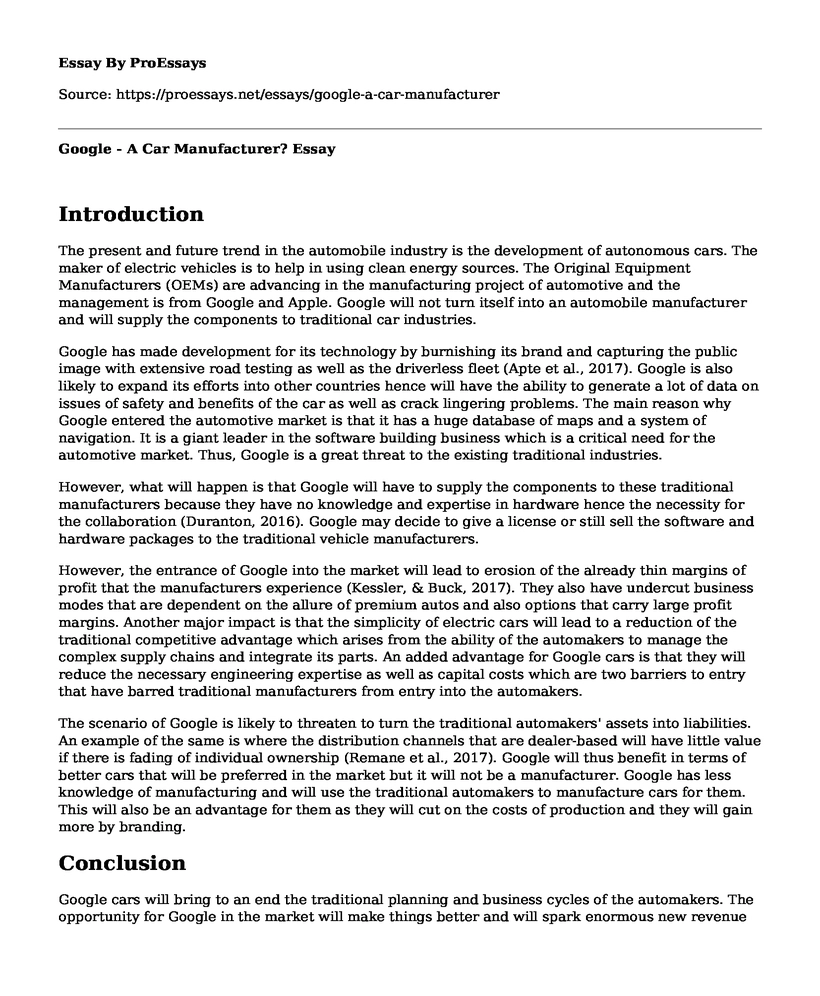Introduction
The present and future trend in the automobile industry is the development of autonomous cars. The maker of electric vehicles is to help in using clean energy sources. The Original Equipment Manufacturers (OEMs) are advancing in the manufacturing project of automotive and the management is from Google and Apple. Google will not turn itself into an automobile manufacturer and will supply the components to traditional car industries.
Google has made development for its technology by burnishing its brand and capturing the public image with extensive road testing as well as the driverless fleet (Apte et al., 2017). Google is also likely to expand its efforts into other countries hence will have the ability to generate a lot of data on issues of safety and benefits of the car as well as crack lingering problems. The main reason why Google entered the automotive market is that it has a huge database of maps and a system of navigation. It is a giant leader in the software building business which is a critical need for the automotive market. Thus, Google is a great threat to the existing traditional industries.
However, what will happen is that Google will have to supply the components to these traditional manufacturers because they have no knowledge and expertise in hardware hence the necessity for the collaboration (Duranton, 2016). Google may decide to give a license or still sell the software and hardware packages to the traditional vehicle manufacturers.
However, the entrance of Google into the market will lead to erosion of the already thin margins of profit that the manufacturers experience (Kessler, & Buck, 2017). They also have undercut business modes that are dependent on the allure of premium autos and also options that carry large profit margins. Another major impact is that the simplicity of electric cars will lead to a reduction of the traditional competitive advantage which arises from the ability of the automakers to manage the complex supply chains and integrate its parts. An added advantage for Google cars is that they will reduce the necessary engineering expertise as well as capital costs which are two barriers to entry that have barred traditional manufacturers from entry into the automakers.
The scenario of Google is likely to threaten to turn the traditional automakers' assets into liabilities. An example of the same is where the distribution channels that are dealer-based will have little value if there is fading of individual ownership (Remane et al., 2017). Google will thus benefit in terms of better cars that will be preferred in the market but it will not be a manufacturer. Google has less knowledge of manufacturing and will use the traditional automakers to manufacture cars for them. This will also be an advantage for them as they will cut on the costs of production and they will gain more by branding.
Conclusion
Google cars will bring to an end the traditional planning and business cycles of the automakers. The opportunity for Google in the market will make things better and will spark enormous new revenue opportunities which will sere connected vehicles and their occupants. In that case, automakers will need to put themselves in the middle of the value in the car market. Google may reap huge amounts of profit from the automotive industry with the use of new technology which will help to make more sales and satisfy consumer demand.
References
Apte, J. S., Messier, K. P., Gani, S., Brauer, M., Kirchstetter, T. W., Lunden, M. M., ... & Hamburg, S. P. (2017). High-resolution air pollution mapping with Google street view cars: exploiting big data. Environmental Science & Technology, 51(12), 6999-7008.
Duranton, G. (2016). Transitioning to driverless cars. Cityscape, 18(3), 193-196.
Kessler, T., & Buck, C. (2017). How digitization affects mobility and the business models of automotive OEMs. In Phantom Ex Machina (pp. 107-118). Springer, Cham.
Remane, G., Hanelt, A., Nickerson, R. C., & Kolbe, L. M. (2017). Discovering digital business models in traditional industries. Journal of Business Strategy, 38(2), 41-51.
Cite this page
Google - A Car Manufacturer?. (2022, Mar 07). Retrieved from https://proessays.net/essays/google-a-car-manufacturer
If you are the original author of this essay and no longer wish to have it published on the ProEssays website, please click below to request its removal:







